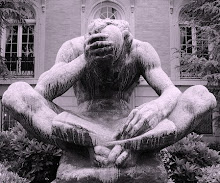
Now that he is affixed to my bag, I can do no wrong. Or is that I won't remember the wrongs I do? Either way, the lil' guy is more popular than anyone else I know.
And I know people who are in indie rock bands.
And people with really good pharmaceutical contacts.
T.T.S. beats them all.
Luckily, he doesn't talk much, so I at least look smarter. I can only wish that I'd talked to Eileen earlier so T.T.S. would have been there to bless my presentation. I could have used the help--though there was only one question that I didn't feel I could answer.
Kathleen Grode (South Dakota) asked: if armor is symbolic of one's status as a thane and one's status among thanes, then why does he do worse in his battles as Beowulf progresses? It's an interesting question. He wears progressively more armor as he advances from fight to fight and he needs more and more help from human technology as he does.
And yet, the outcome of the fight between Beowulf and Grendel is never in doubt (at least to the audience and narrator). But with Ellen (what I call Grendel's mother because Chelsea Henson and I are tired of her having an identity that's tethered to Grendel), Beowulf almost gets his ass kicked. If it hadn't been for his mail shirt, he'd have been killed by her seax. If it hadn't been for the work of giants--the sword that melts--it seems that he would not have been able to kill her. And the dragon...well, that wyrm necessiated--as Britt Mize pointed out--the creation of a new piece of war gear. That doesn't happen in any other Old English work with which I am familiar. It's incredible. But it still doesn't work, and Beowulf of course dies as a result of the poisoned bite of the dragon.
I think what Jim Earl would say here is that the narrative demands these incrementally more difficult battles and that Beowulf dies. And I agree that the poet is--as Felicity Riddy noted that Malory was--hemmed in by history. Beowulf has to stay in the heroic past (as Methuselah, Moses, Adam, Noah, etc. had to) because no one when the poet(s) was writing could swim for seven days.
But I don't know. I agree, but I think it still begs the question. If my thesis is that armor is symbolic of a warrior society and that's why the Grendelkin don't wear it, then it's odd that as armor becomes more involved in these fights, Beowulf does more poorly until he dies. My original answer is all I've been able to come up with since then: that Beowulf, as an aglæca and as a monster-man, does more poorly because he becomes less himself--and more Geatish warrior. Beowulf is as much monstrous as he is Geatish--and that's probably what a hero is all about anyway. Your normal everyday thane (like, say, Hondscio and Aeschere) doesn't do so well against these monstrous antagonists: you gotta fight fire with fire. But as he becomes more and more the Geatish warrior and ruler, when he moves from the--as Mary Ziehe so aptly put it--orde to the interior of the society, he becomes less the hero and more the god cyning.
Of course, that's something that any British Lit. Survey student would know about Beowulf, so what else is there to say? I don't know. I'm still thinking about it because I just found out I got into the MEARCSTAPA panel at K'zoo in May (along with Karma who did a cool philological look at untydras in Beowulf). It won't, of course, be the same paper I gave here at SEMA, but it relies on the same general idea, and I need to get my ducks in a row if'n I want to continue this line of inquiry.
Suggestions will be welcomed with great joy.

2 comments:
I wonder if this is just a function of the apocalyptic nature of the times, which I suppose puts me in agreement with Jim. If humankind is in fear of dying out, and the prime example of humankind is hemmed in my history so that he must die, then aren't any attempts he (and we) make to survive ultimately useless? If God (or whoever) has decreed that Beowulf and humankind are toast, then no valorous or technological advances we dream up can help us.
Thanks for the plug, by the way.
Unless you could kill God. Or create a burrito so hot even he could not eat it.
I think--and I've said this over at ITM previously, I think--that we in some ways are in the same spot as Harold Bloom's reading of Satan in Paradise Lost. We're here, we're screwed, so let's make the best of a bad situation. That's an over-simplification, of course, but it's the gist of his reading.
Post a Comment